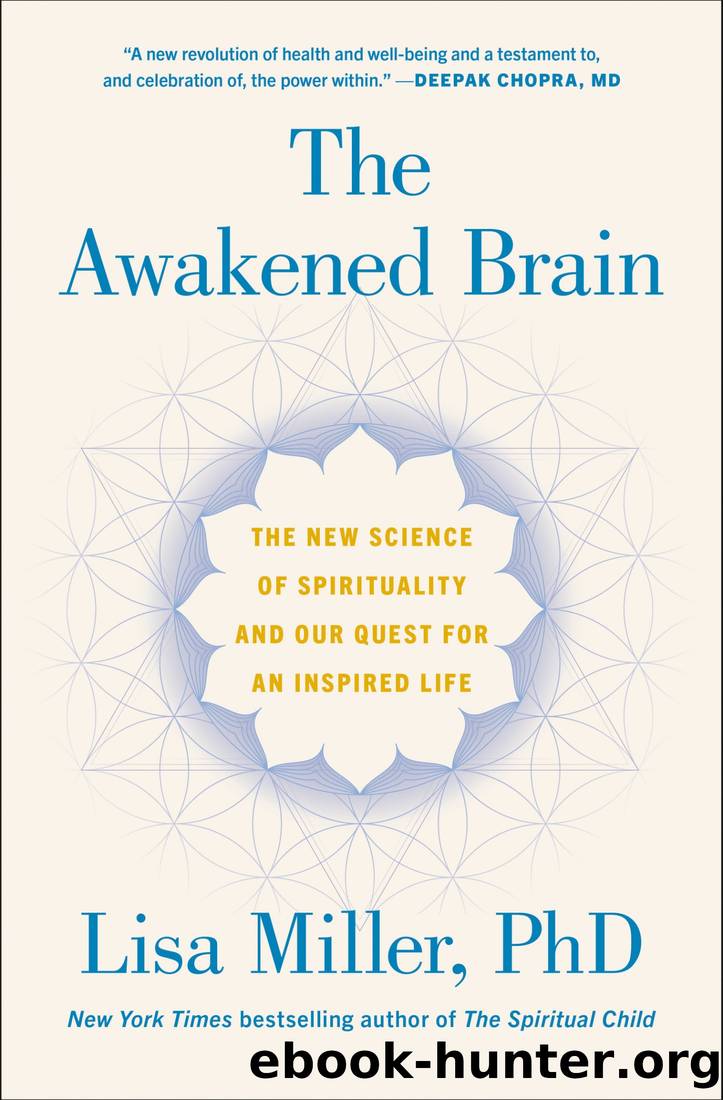The Awakened Brain: The New Science of Spirituality and Our Quest for an Inspired Life by Lisa Miller

Author:Lisa Miller [Miller, Lisa]
Language: eng
Format: epub
Tags: Psychology, General
ISBN: 9781984855626
Google: Gic5EAAAQBAJ
Publisher: Random House Publishing Group
Published: 2021-11-15T23:19:17.509953+00:00
A DIFFERENT LIFE
âYouâre not going to believe this,â my friend and fellow researcher Dr. Suniya Luthar said one afternoon in 2008. We were sitting in her university office, cafeteria salads awkwardly balanced on our knees, meeting to discuss how to abate the significantly elevated rates of depression our field was seeing across the United States.
Iâd known Suniya since I was an undergrad at Yale and she was the teaching assistant for my abnormal psychology class. Sitting in her class as a nineteen-year-old, Iâd been inspired to see this lively, engaging woman, so radiant she practically sparkled, who was also an intense academic. With Suniya, there was never any small talk. Intelligent and intense, she looked at the world with laser focus. She was a scientistâs scientistâfollowing the trail of the numbers, striving to get to the bottom of a mystery or problem. Her early work on the intersection between poverty and mental health had contributed to the formation of Head Start programs, and had modeled the power of science to change and improve lives. Now she was a tenured professor of psychology at Columbia, still committed to doing research that supported the welfare of kids, especially teens growing up in under-resourced urban areas. Because rates of depression shoot up between the ages of twelve and eighteen, it was vital to focus on adolescents if we were to curb the growing epidemic.
As we crunched our bland lettuce, Suniya filled me in on the recent surprising turn in her research. She had been looking for a comparison group for the urban youth population she was studying, and had begun investigating upper-middle-class teens in affluent suburbs outside of New York City, San Francisco, and other major U.S. cities. But as she learned more about these affluent suburban comparison groups, she found that the âprivilegedâ or ârichâ kids were doing markedly worse in several measures than their less affluent peers. They had much higher rates of substance abuse, depression, and anxiety, and despite having resources and physical safety, felt more vulnerable and fearful.
The finding surprised many people in the field. By and large, the affluent kids had engaged and supportive parents, they went to highly ranked schools, they had the resources for enrichment activities and travel, they enjoyed many educational, professional, and social opportunities and never wanted for food to eat or safe streets to walk. Why were they so depressed?
By going into the schools and interviewing kids, Suniya had identified a social ecology that she thought explained their mental suffering. For one thing, the majority of affluent kids in her study had perceptions of contingent love from their parents and families. They said things like âMy dad shows up at my soccer games, but not at family dinner,â or âMy mom asks me, âHow did you do on the math test?,â not âHow are you feeling?âââ Many of the kids said they felt like commodities. Their job was to performâacademically, athletically, musicallyâand earn their parentsâ approval. Endless attention was paid to report cards and trophies and rankings.
Download
This site does not store any files on its server. We only index and link to content provided by other sites. Please contact the content providers to delete copyright contents if any and email us, we'll remove relevant links or contents immediately.
Machine Learning at Scale with H2O by Gregory Keys | David Whiting(4296)
Never by Ken Follett(3937)
Harry Potter and the Goblet Of Fire by J.K. Rowling(3848)
Unfinished: A Memoir by Priyanka Chopra Jonas(3383)
Fairy Tale by Stephen King(3372)
The Man Who Died Twice by Richard Osman(3073)
Will by Will Smith(2911)
Rationality by Steven Pinker(2352)
It Starts With Us (It Ends with Us #2) by Colleen Hoover(2346)
Can't Hurt Me: Master Your Mind and Defy the Odds - Clean Edition by David Goggins(2324)
The Dark Hours by Michael Connelly(2300)
The Storyteller by Dave Grohl(2229)
Friends, Lovers, and the Big Terrible Thing by Matthew Perry(2219)
The Dawn of Everything: A New History of Humanity by David Graeber & David Wengrow(2197)
The Becoming by Nora Roberts(2189)
The Stranger in the Lifeboat by Mitch Albom(2113)
Cloud Cuckoo Land by Anthony Doerr(2104)
Love on the Brain by Ali Hazelwood(2062)
Einstein: His Life and Universe by Walter Isaacson(2012)
